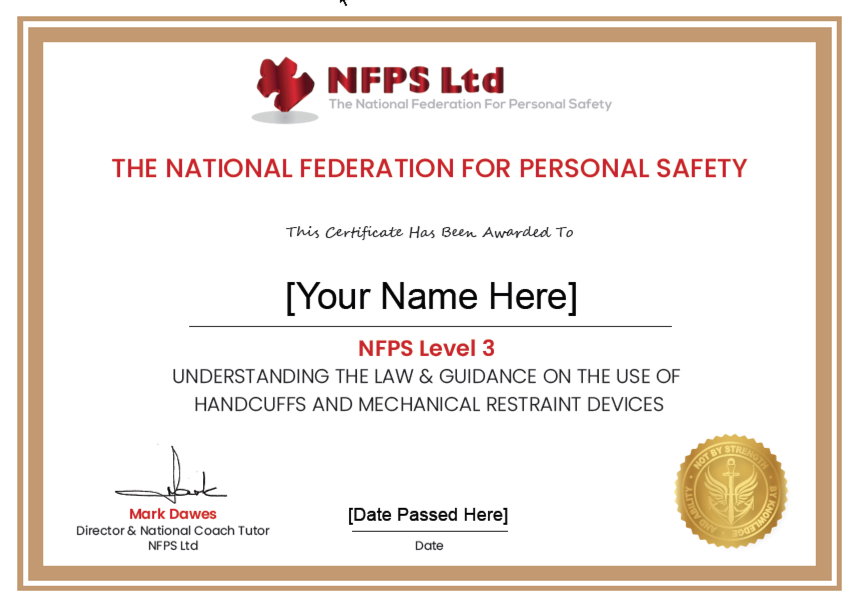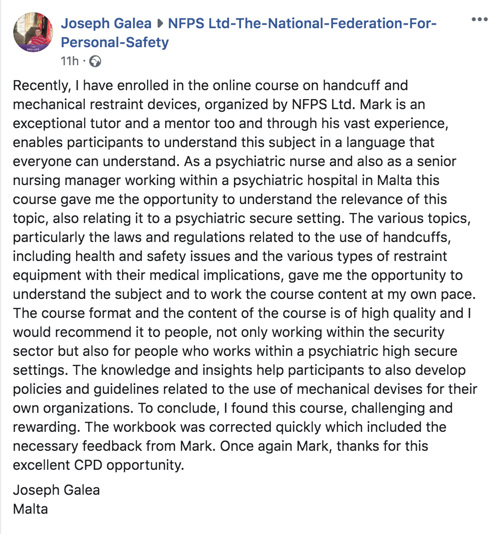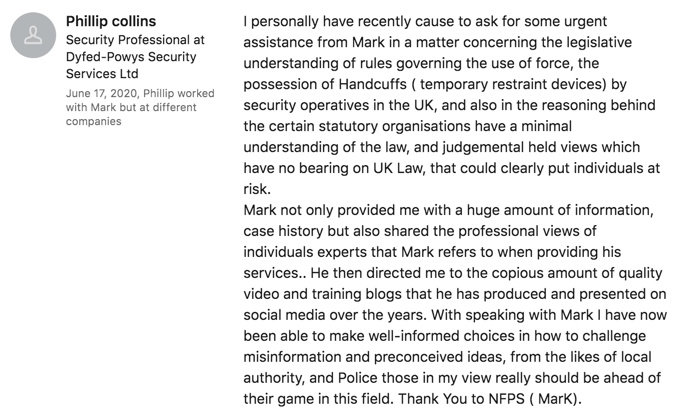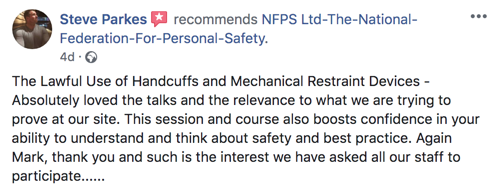NFPS Level 3 Award In Understanding The Law & Guidance On The Use of Handcuffs and Mechanical Restraint Devices
Including A NFPS Level 3 Certificate in Understanding The Law & Guidance On The Use of Handcuffs & Mechanical Restraint Devices
And Here Are Just Some of The of The Benefits You Will Receive When You Do This Online Course ...

Legally Accurate and Defensible Training: Find out about what the law really allows with regards to the carriage and use of handcuffs.

Health & Safety Compliant Training: Learn about how Health & Safety legislation applies with regards to the use of handcuffs in the workplace.

The Benefits of Handcuffing: Learn about how handcuffs can actually reduce risk to staff and others and even save lives.

Great Evidence of CPD: This course provides you with excellent CPD if you who need to evidence a certain number of CPD hours per year.
To Invest In This Awesome Course Choose One Of The Two Payment Options Below ....
Here's The Problem.....

According to the BBC News report Detective Chief Inspector David Reid from the Metropolitan Police said: “Lorraine Barwell was not a threat to Humphrey Burke; she was merely doing her job – the same job that she had carried out with dedication and professionalism for many years.”

This Course Is The Solution - Check Out The Resources ........
Get a NFPS Level 3 Certificate (Great For CPD Evidence)
This course comes with a NFPS Level 3 Certificate in ‘Understanding The Law & Guidance on The Use of Handcuffs & Mechanical Restraint Devices’ and because the course is all online there is no need to attend any face-to-face training.

This Training is ideal for you if you are someone who:
- Is currently a Handcuff Trainer and wants some more excellent cpd certification;
- Responsible for the management of staff who use handcuffs in the workplace;
- Is responsible for investigating any incidents in the workplace that may involve handcuffs;
- An Inspector responsible for inspecting organisations against their specific regulatory standards.
- Is looking to become a Handcuff Trainer (this course will teach you what you need to know).
The Law Requires You To Be Competent
Here Are A Summary of The Benefits That You Will Receive When You Decide To Do This Course ...

Legally Accurate and Defensible Training: You can be safe in the knowledge that the knowledge and information that you will receive is possibly the most legally accurate and defensible of it’s kind in the UK today, because you will learn about the law and guidance in relation to the use of handcuffs and mechanical restraint devices.

Health & Safety Compliant Training: Learn about how Health & Safety legislation applies with regards to the carriage and use of handcuffs in the workplace.

The Medical & Health Benefits of Handcuffing: Learn about the medical and health benefits of handcuffing and how handcuffs can actually reduce risk to staff and others and even save lives.

Great Evidence of CPD: This course provides you with excellent CPD if you who need to evidence a certain number of CPD hours per year. We estimate that this course (due to the amount of content and value contained in it) equates to at least 20 hours of Continual Professional Development for you, so it is definitely worth doing.
To Invest In This Awesome Course Choose One Of The Two Payment Options Below ....
What Are The Drawbacks of Not Doing This Course?
By not doing this course you may not be able to evidence your understanding of this subject.
And Here Are Some Reviews & Testimonials From Those Who Have Done This Course.....




It's Now Up To You To Decide To Do This Course or Not.
It’s now up to you to decide whether or not you do this course.
I genuinely and sincerely hope that you do take me up on this offer.
One reason is that the knowledge alone will help keep you safer.
Another reason is it may actually help save a life.
Hopefully I’ll see you on the course, but if you want to talk to me in person about it please feel free to reach out to me by filling out the form below.
Best Regards
Mark Dawes
May you be safe, happy, health and live at ease.
